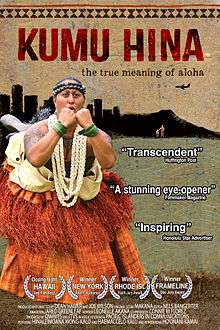Kumu Hina
Kumu Hina is a 2014 documentary film by Dean Hamer and Joe Wilson and is the story of Hina Wong-Kalu. It premiered at the Hawaii International Film Festival and aired on Independent Lens, a PBS program, in May 2015.
| KUMU HINA | |
|---|---|
 | |
| Directed by | Dean Hamer and Joe Wilson |
| Produced by | Dean Hamer and Joe Wilson |
| Music by | Makana, Kealiʻi Reichel |
| Cinematography | Dean Hamer, Joe Wilson, Connie M. Florez, Fred Vanderpoel, John Kuamoo, Cindy Iodice |
| Edited by | Nels Bangerter |
Production company | Qwaves and Independent Television Service Pacific Islanders in Communicationas |
| Distributed by | Passion River Alexander Press |
Release date |
|
Running time |
|
| Country | United States |
| Language | English Hawaiian Tongan |
| Budget | $410,000 |
Synopsis
Hina Wong-Kalu is a māhū - a Native Hawaiian kumu (teacher), activist and cultural icon. She lives her life "in the middle", in between the traditional ways of Hawaii's indigenous, third gender, māhū culture, and as a modern transgender person in contemporary Hawaii, trying to preserve and pass on the indigenous culture to the younger generations.
During the year covered by the film, Kumu Hina mentors one of the girl students who also finds herself "in the middle" when she wants to join the all-male hula group in her school. The film also follows Kumu Hina's personal life as she seeks a committed romantic relationship with a younger man from Tonga, and we travel with her into the hills to meet her elders, the traditional third gender māhū who live together on the land and provide her with spiritual guidance.
Reception
Kumu Hina won the Documentary Jury award at the Frameline Film Festival [1] and the Audience Award as the most popular documentary among voting viewers for the 2014–2015 season of Independent Lens.[2] In 2016, the film won Outstanding Documentary from the GLAAD Media Awards.[3]
Filmmaker Magazine called the film "a stunning eye-opener",[4] while Indiewire considered it "incredibly poignant and moving", and Yes! Magazine commended the film for "lift(ing) the veil on the misunderstood and marginalized experience of “other” gendered individuals whose identity cannot be defined by the broad strokes of contemporary Western categorization.[5]
Awards and recognition
- PREMIERE Hawaiʻi International Film Festival, closing night film[6]
- WINNER Jury Award for Documentary Achievement, Frameline International LGBT Film Festival[7]
- WINNER Audience Award, FIFO Pacific International Documentary Film Festival Tahiti[8]
- WINNER Special Jury Award, FIFO Pacific International Documentary Film Festival Tahiti[8]
- WINNER Youth Jury Award, Rhode Island International Film Festival
- WINNER Special Jury Award, San Diego Asian Film Festival
- WINNER Jury Award, Honolulu Rainbow Film Festival
- WINNER Jury Award, Out Here Now Kansas City Film Festival
- WINNER Silver Reel Documentary Jury Award, Reeling Chicago LGBT International Film Festival
- WINNER Audience Award, New York Asian American Film Festival[9]
- WINNER Audience Award, Venezuaela Cine de la Diversidad
- WINNER Best Feature, Tilde Melbourne Trans and Gender Diverse Film Festival
- CLOSING NIGHT – Beijing Queer Film Festival[10]
- CLOSING NIGHT– Tilde Melbourne Transgender and Diverse Film Festival
- CLOSING NIGHT – Philadelphia Asian Film Festival
- OPENING NIGHT –Kansai Japan Queer Film Festival
- WINNER - GLAAD Media Award for Outstanding Documentary
- AUDIENCE AWARD - PBS/Independent Lens
Television Broadcast
- BROADCAST PREMIERE Independent Lens on PBS, May 4, 2015
- REBROADCAST America ReFramed on PBS/World Channel
Education campaign
The filmmakers initiated an education campaign to bring Kumu Hina's message to diverse audiences. The campaign, launched at an event at the Ford Foundation, includes a short children's version of the film, A Place in the Middle, and teaching and classroom discussion guides.[11][12]
References
- http://blogs.indiewire.com/bent/the-film-that-charmed-frameline-the-reasons-why-award-winning-indie-documentary-kumu-hina-deserves-a-wide-audience-are-precisely-why-it-might-miss-out-20140717
- https://www.pbs.org/independentlens/blog/and-the-winner-of-the-2014-2015-independent-lens-audience-award-is/
- http://www.glaad.org/mediaawards/nominees
- http://filmmakermagazine.com/86837-transformers-the-asian-american-international-film-festival/#.U9BGPUjPbW4
- http://w.futurenet.org/issues/make-it-right/what-native-hawaiian-culture-can-teach-us-about-gender-identity
- http://www.expression808.com/home/2014/4/11/photos-kumu-hina-world-premiere-film-at-sold-out-hawaii-thea.htm
- Jeremy Staley (2 July 2014). "Frameline Announces 2014 Festival Winners, From 'Somethin - /Bent". /Bent.
- "Tender and Kumu Hina, the overall festival winners - en.fifo-tahiti.com". fifo-tahiti.com.
- "The 37th Asian American International Film *Festival Announces Award Recipients". 2014 Asian American International Film Festival.
- "Hiding in Plain Sight: The Beijing Queer Film Festival". Filmmaker Magazine.
- An Evening With Kumu Hina
- http://aplaceinthemiddle.org